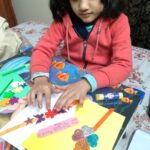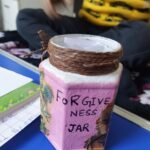
MANJU RANA
Principal Cum Director
Seth Anandram Jaipuria School
Vasundhara, Ghaziabad
SEL or ‘Social and Emotional Learning’ is one such process which equips the children to manage their emotions effectively and feel and demonstrate empathy towards others. To live peacefully and constructively in the society requires a wide range of social skills. SEL is a practice which helps young learners acquire healthy identities and shape them into supportive, caring and responsible citizenry.
In today’s time, technology has pervaded every household. A million pros can be nullified easily with a few cons, if obsession takes over good judgement. Addicted to cell phones, many kids nowadays seek safe haven in the virtual worlds they have woven for themselves, thereby distancing themselves with the turmoil and chaos they encounter in the real world. This may lead to poor social and coping skills leaving the kids isolated and lonely and bereft of human interactions.
School is considered as the second home for the children. Environment of a school plays a vital role in shaping a child’s personality and transforming him/her into a responsible and empathetic global citizen. The best of academics or technology or teachers can fall short unless the young learners master the art of handling stress, adopt problem solving approach and practice conflict resolution. When students feel safe and supported, learning takes place in full swing. Hence, developing socio-emotional skills becomes the need of the hour, so that students, teachers, parents can collaboratively work towards building supportive learning environments.
Well – known for its ground breaking philosophies and unprecedented initiatives, Seth Anandram Jaipuria School Vasundhara, Ghaziabad took the initiative of integrating SEL into the school curriculum in 2018. From Pre Nursery to Grade XII, the focus of SEL has been to enhance five core competencies, namely empathy, self management, social awareness, relationship skills and responsible decision making. To promote ethical learning among students, the school planned an array of activities. To ensure learner engagement, diverse tools such as MS Forms, Padlet, Wakelet, Word Wall, Quizziz, videos, Ed puzzle, documentaries, stories, discussions in classrooms, etc. were put to use. Students worked alone and in assorted groups and participated actively and enthusiastically.
Also read: Impact of Technology in Educating Gen Z: A Global Perspective
The most notable feature of this initiative was the deftness with which these social and emotional skills were integrated with all the subjects, thereby making them an indispensable part of the students’ learning. Besides developing empathy for self, students were able to develop empathy for their family members, peers, society and environment. The issue of bullying of peers on social networking sites, leading to their deteriorated mental health, was addressed very subtly but effectively. Students were able to connect with each other in a better manner which led to enhanced confidence and effective communication. The reflections and activities undertaken by students proved beyond doubt that they were being shaped into conscientious world citizens who understand their role and responsibility in making the world a better and safer place for all.
Real life situations were presented wherein the students were asked to introspect and analyze their fears and anxieties especially when a pandemic had overtaken the entire world by storm. Identifying the issues and brainstorming about the solutions led to students introspecting and devising ways and means to manage their anger, stress effectively.
Many discussions about the need for a strong commitment to the well-being of the community as a whole resulted in developing the feeling of gratitude and compassion for the ‘have-nots’ of the society. A surprising number of students donated sweets, extra food, books, old clothes, toys, etc to the needy. Few students who were part of NGOs such as Robin Hood Academy shared their experiences and motivated their peers.
The overwhelming response of the parents lauding the novel efforts of the school bears testimony to the positive changes in the behavioural pattern of the students in terms of their healthier social relationships, better problem-solving approach and better clarity of their strengths and abilities. As the students continue to develop these skills, the culture of the school will only continue to improve.
























